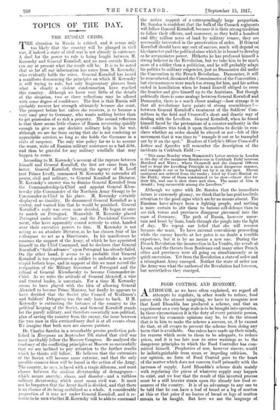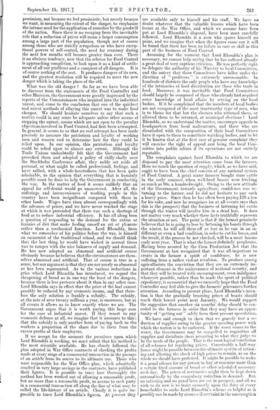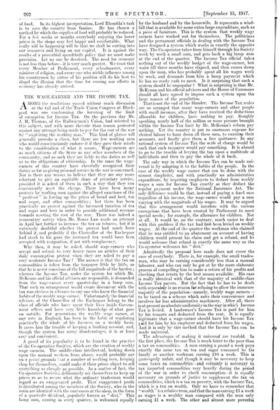FOOD CONTROL AND ECONOMY.
ALTHOUGH, as we have often explained, we regard all attempts to regulate, in other words to reduce, food prices with the utmost misgiving, we have to recognize now that Lord Rhondda has produced a scheme, and that an experiment on a very large scale is to be brought into operation. In these circumstances it is the duty of every patriotic person, whatever his economic opinions may be, to do the utmost that is in him to make the scheme a success, or, if he cannot do that, at all events to prevent the scheme from doing any harm that is avoidable. Our rulers have made up their minds, for reasons which seem to them to be adequate, to reduce prices, and it is too late now to utter warnings as to the dangerous principles to which the Food Controller has com- mitted himself. Prophecies of woe, however sincere, would be indistinguishable from mean or impeding criticism. In our opinion, no form of Food Control goes to the heart of the matter which does not concern itself primarily with the increase of supply. Lord Rhondda's scheme deals mainly with regulating the prices of whatever supply may happen to exist, and we fear that the result of this inverted process must be a still heavier strain upon the already low food re- sources of the country. It is of no advantage to any one to be told that he can have a loaf of bread or a leg of mutton at this or that price if no loaves of bread or legs of mutton remain to be bought. But here we use the language of
pessimism, not because we feel pessimistic, but merely because we want, in measuring the extent of the danger, to emphasize the intense need for theapplieation of remedies by the goodwill of the nation. Since there is no escaping from the inevitable rule that a reduction of prices will mean a larger consumption among a large part of the population, though not of course among those who are strictly scrupulous or who have excep- tional powers of self-control, the need for economy during the next few months will become greater than ever. There is an obvious tendency, now that the scheme for Food Control is approaching completion, to look upon it as a kind of settle- ment of all our problems and a conquest of all dangers. It is of course nothing of the sort. It produces dangers of its own, and the greatest resolution will be required to meet the new danger which is taking the place of the old.
What was the old danger ? So far as we have been able to discover from the statements of the Food Controller and other Ministers, the Government were greatly impressed by the reports of the Commissioners who inquired into the industrial unrest, and came to the conclusion that one of the quickest and surest methods of allaying this unrest was to make food cheaper. We should hesitate ourselves to say that such a motive could in any sense be adequate unless other means of stopping the unrest, means which are not open to the peculiar objections involved in Food Control, had first been attempted. In general, it seems to us that no real attempt has been made precisely to measure the patriotism and loyalty of working men and women and to determine how far they could be relied upon. In our opinion, this patriotism and loyalty could be relied upon to almost any extent. Although the Trade Unions undoubtedly felt that the Government had provoked them and adopted a policy of shilly-shally over the Stockholm Conference affair, they nobly set aside all personal, or what might be called professional, feelings, and have rallied, with a whole-heartedness that has been quite admirable, to the opinion that everything that is humanly possible must be done to help the Government in conducting the war. In the matter of food it seems unlikely that an appeal for self-denial would go unanswered. After all, the sufferings and inconveniences of working people in this country have been insignificant compared with those in other lands. Wages have risen almost correspondingly with the advance of prices, and we have never reached the stage at which it was pretended that there was such a shortage of food as to reduce industrial efficiency. It has all along been a question of responding to the demand for the extras or luxuries of diet that make feeding oneself an art or pleasure rather than a mechanical function. Lord Rhondda, from what we remember of his politics before the war, is himself an economist of the traditional school, and we should think that the last thing he' would have wished in normal times was to tamper with the nice balances of supply and demand. He has now adopted an abnormal and artificial course obviously because he believes that the circumstances are them- selves abnormal-and artificial. That of course is true in a sense, but our argument is that they are not nearly so abnormal as has been represented. As to the various reductions in price which Lord Rhondda has introduced, we regard the cheapening of bread as in one -way the least of the dangers, because there is less pretence about it than in any other case. Lord Rhondda says' in effect that the price of the loaf cannot possibly be reduced by any economic means, and that there- fore the only solution is frankly a subsidy. The subsidy, at the rate of over twenty millions a year, is enormous, but at all events it allows us to know exactly where we are. The Government argue that it is worth paying this large sum for the cure of industrial unrest. If they resort to any economic defence at all, we imagine that it amounts to this : that the subsidy is only another form of paying back to the workers a proportion of the share due to them from the excess profits of their employers.
If we accept for the moment the premisses upon which Lord Rhondda is working, we must admit that his method is the most scientific available. He has closely followed the plan adopted in War Office contracts of checking the profits made at every stage of a commercial transaction in the passage of an article from its source to its ultimate use. Those who were responsible for the War Office plan, which admittedly resulted in very large savings in the contracts, have published their figures. It is possible to trace how thoroughly the method has been worked out of allowing a reasonable profit, but no more than a reasonable profit, to accrue to each party in a commercial transaction all along the line of what may be called the life-history of an article. Clearly it is quite im- possible to trace Lord Rhondda's figures. At present they are available only to himself and his staff. We have no doubt whatever that the valuable lessons which have been learnt at the War Office, and which we assame have been put at Lord Rhondda's disposal, have been most carefully followed. Lord Rhondda is a man who spares himself no pains, and we imagine that when the figures come out it will be found that there has been no failure in care or skill in this part of the business of Food Control.
Assuming for the moment that Lord Rhondda's plan is necessary, we cannot help saying that he has suffered already a great deal of very captious criticism. He was perfectly right to delegate the authority of his Ministry to local Committees, and the outcry that these Committees have fallen under the direction of " profiteers " is extremely unreasonable. In hundreds of districts the only people who have any knowledge of the intricacies of food distribution are those who trade in food. Moreover, it was inevitable that Food Committees should largely be composed of those who already had acquired some knowledge of local- affairs by serving on the local bodies. If it be complained that the members of local bodies are not composed of the most trustworthy type of men, who is to blame for that but the electors who returned them, or allowed them to be returned, at municipal elections ? Lord Rhondda, as we understand the matter, encourages appeals to headquarters from local malcontents, and those who are dissatisfied with the composition of their local Committees have it open to them to constitute watching bodies, and to let it he known that at the first case of genuine complaint they will exercise the right of appeal and bring the local Com- mittee into public odium if its operations are not entirely reputable.
The complaints against Lord Rhondda to which we are disposed to pay the most attention come from the farmers. Here we tough the question of supply, which, as we have said, ought to have been the chief concern of any national system of Food Control. A great many farmers bought store cattle in the early summer, when well-bred beasts were fetching as much as 90s. a hundredweight. Owing to the new attitude of the Government towards agriculture, confidence was re- turning to the farmer, and he did not hesitate to pay such a heavy price. Since then he has often been paying £20 a ton for his cake, and now he recognizes (or at all events says that this is the prospect) that the business of fattening his cattle through the winter will involve him in a dead loss. It does not matter very much whether these facts truthfully represent the situation or not. The point is that if the farmer genuinely believes that he is going to lose by fattening his boaststhrough the winter, he will sell them off as fast as he can in an in- different or even a bad condition, in order to cut his losses, and the result, if the process be not checked, will be a meat famine early next year. That is what the farmer definitely prophesies. Having been assured by the Corn Production Act that the Government at last recognized that it was all-important to Create in the farmer a spirit of confidence, he is now suffering from a rather violent revulsion. To produce among agriculturists the conviction that they are an extremely im- portant element in the maintenance of national security, and that they will be treated with encouragement, even indulgence whenever possible, rather than be made the sport of political expediency, is so essential that we earnestly hope that the Food Controller may feel able to give the farmers' grievances further attention. According to present plans, Lord Rhondda's inten- tion is that the gradually lessening prices of beasts should reach their lowest point next January. We would support the suggestion that another six months' delay should be con- ceded to the farmers in order that they may have an oppor- tunity of "getting out" safely frown their present speculation.
We have said enough to show that we gravely fear a re- duction of supplies owing to the greater spending-power with which the nation is to be endowed- If the worst comes to the worst, the Government may be compelled to requisition all
supplies and distribute them according to what they judge to be the needs of the people. That is the most logical conclusion
of all schemes for regulating prices. Conceivably a half-way house might be possible between this ultimate systein of ration- ing and allowing the check of high prices to remain, as on the whole we should have preferred. It might be possible to make
it a penal offence for any person to buy or consume more than a certain fixed amount of bread or other scheduled necessary
each day. The prices of necessaries might then be kept down automatically by the compulsory reduction in demand. But no rationing and no penal laws are yet in prospect, and all we wish to do now is to insist earnestly upon the duty of every householder to make Lord Rhondda's scheme as helpful as it possibly can be made by severe self-restraint in the consumption of food. In its highest interpretation, Lord Rhondda's task is to save the country from famine. He has chosen a method by which the supplies of food will probably be reduced. For a few weeks or months everybody enjoying the lower prices in the shops may feel happy and comfortable. What really will be happening will be that we shall be cutting into our resources and living on our capital. It is against the results of a proverbial spendthrift policy that we must make provision. Let no one be deceived. The need for economy is not less than before—it is very much greater. We trust that every Member of Parliament, every schoolmaster, every minister of religion, and every one who wields influence among his countrymen by virtue of his position will do his best to dispel the illusion that the time for ceasing our efforts in economy has already arrived.




























 Previous page
Previous page